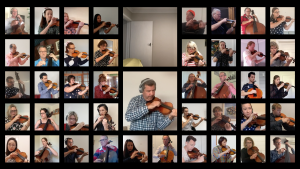Chance leads to instrument of choice
12.05.2020
Jenna Smith, Trumpet
I started on piano but I really didn't enjoy it. My brother's best friend played the trumpet and I thought he was cool so I wanted to play the trumpet like him. It wasn't for the sound or the look of the instrument.
I got my first professional standard trumpet when I was in year six, and my teacher chose the trumpet for me, so I really didn't have a say in the matter. I didn't take my practice seriously until I was in late high school. In fact, I wanted to stop playing, but my mum was very encouraging and I'm glad she made me stick with it!
When I was in year 12 my trumpet teacher encouraged me to buy a C trumpet. I was nervous and unsure of what to look for but after spending an hour trying different trumpets I settled on my current instrument because I loved the bright sound it had and it was comfortable to play. It's the trumpet I use for most of my orchestral playing now.
My current collection of instruments includes Bb, C, D/Eb trumpets, a rotary C trumpet, piccolo trumpet and a flugelhorn. I wish somebody had warned me how many different trumpets I would need! In hindsight, perhaps I should have picked the French horn or the bass trombone (I love the sound).
Andrew Tait, Double Bass
I was playing bass guitar in a rock band at school in the 1970’s, which was very successful and I bought a recording of The Modern Jazz Quartet called Blues in Bach. The bass player was Percy Heath and when I heard his solo I was hooked, I just fell in love with the sound!
I went straight out and bought one…not a good move if you don’t have a teacher or a luthier to advise you.
Luckily I sold that first instrument for the amount that I paid for it ($500), thus began my learning education about the double bass.
Leanne Glover, Cor Anglais
I grew up on a merino wool sheep farm 15 km out of Mt. Barker in the Great Southern of Western Australia. It was a completely wonderful place to grow up, but never the less, one that was not well known for its Western Art Music. The journey to becoming a professional classical musician has been filled with chance and such extreme good fortune that I can’t really believe it.
My first instrument was a toy xylophone when I was three years old. My mum told me it used to make me mad because it “didn't have all the notes on it”. I would try to play the little tunes I knew but having no sharps or flats it always sounded wrong. So it was decided both my sister and I would get some music lessons.
My second instrument, decided by my parents may I add, was the piano accordion. A farmer down the road played in a local dance band and agreed to teach me. I think I was seven years old, I could barely see over the top of it. But it was fun and I loved it. The accordion has a terrible reputation but tell that to Piazzolla!
During these couple of years my sister was learning the clarinet from another local farmer who had emigrated from England and was a mad keen classical musician. John Bush is a local legend in the area and taught all of the woodwind instruments at the school. He was an inspired teacher and we were so lucky to have him. From what Mum told me, I heard the oboe on the radio and immediately announced I wanted to play that. John Bush just happened to have one lying under his son's bed (who incidentally had given it up to play the drums). It was, unsurprisingly, the only oboe in the region. And so began my love affair with the oboe. I was 10 years old.
Within a relatively short amount of time John had all his family and students playing wind quintets, octets, Mozart gran partitas, serenades, all the good stuff. I'm not sure what we sounded like but the experience of learning and playing like this was amazing. He also created the Quaranup Music Camp experience where once a year for 10 wonderful sleep deprived days, country kids like me got to play in orchestras and ensembles with other students, amateurs and professional tutors from Perth. I think I learnt more in those 10 days than months of practice in my bedroom.
It was also at this music camp where I met Janet Anderson. She was a keen amateur oboist who tragically died of cancer. Completely amazingly she left her beautiful Cor Anglais to me in her will because she thought I had promise. I was 12 years old. For a few years it lived on top of my parents’ wardrobe as I became more interested in riding horses than playing either the oboe or the Cor Anglais. Then something clicked in me and music became my complete and absolute passion. I had to go away to boarding school for the last two years of high school where I could actually do music as a school subject. Then came four years at UWA, four years studying overseas in Amsterdam and Zurich, then, amazingly, I won my job in WASO.
So, luck, chance, and smiling good fortune led me down the oboe/Cor Anglais path. It has been an unusual career for a girl from the bush but I feel extremely grateful for the opportunities and experiences that it has given me. Forever grateful.
